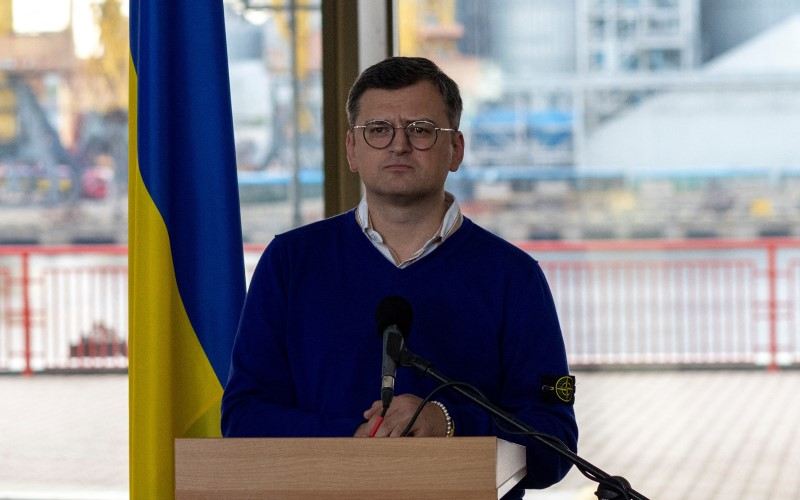Ukraine, West denounce Russian referendum plans for occupied regions

Ukraine’s Foreign Minister Dmytro Kuleba attends a news conference in Odesa, Ukraine, September 14, 2022.
11:08 JST, September 21, 2022
KYIV (Reuters) – Moscow-installed leaders in occupied areas of four Ukrainian regions plan to hold referendums on joining Russia in coming days, a challenge to the West that could sharply escalate the war and which drew condemnation from Ukraine and its allies.
In the apparently coordinated move, pro-Russian figures announced referendums for Sept. 23-27 in Luhansk, Donetsk, Kherson and Zaporizhzhia provinces, representing around 15% of Ukrainian territory, or an area about the size of Hungary.
“The Russians can do whatever they want. It will not change anything,” Ukraine’s Foreign Minister Dmytro Kuleba said on Tuesday in response to reporters’ questions at the United Nations.
In a tweet, he added: “Ukraine has every right to liberate its territories and will keep liberating them whatever Russia has to say.”
Some pro-Kremlin figures framed the referendums as an ultimatum to the West to accept Russian territorial gains or face an all-out war with a nuclear-armed foe.
“Encroachment onto Russian territory is a crime which allows you to use all the forces of self–defence,” Dmitry Medvedev, a former Russian president and now hawkish deputy chairman of President Vladimir Putin’s Security Council, said on social media.
JUSTIFICATION TO MOBILISE
Reframing the fighting in occupied territory as an attack on Russia could give Moscow a justification to mobilize its 2 million-strong military reserves. Moscow has so far resisted such a move despite mounting losses in what it calls a limited “special military operation” rather than a war.
U.S. National Security Adviser Jake Sullivan said Washington rejected any such referendums “unequivocally.” Washington was aware of reports Putin might be considering ordering a mobilization, Sullivan said, adding it would do nothing to undermine Ukraine’s ability to push back Russian aggression.
Russia already considers Luhansk and Donetsk, which together make up the Donbas region Moscow partially occupied in 2014, to be independent states. Ukraine and the West consider all parts of Ukraine held by Russian forces to be illegally occupied.
Russia now holds about 60% of Donetsk and had captured nearly all of Luhansk by July after slow advances during months of intense fighting.
Those gains are now under threat after Russian forces were driven from neighboring Kharkiv province this month, losing control of their main supply lines for much of the Donetsk and Luhansk front lines.
Unverified footage on social media showed Ukrainian forces in Bilohorivka, which lies just 10 km (6 miles) west of the Luhansk city of Lysychansk that fell to the Russians after weeks of some of the war’s most intense fighting in July.
‘SOME NOISE’
“The situation on at the front clearly indicates the initiative is with Ukraine,” Ukrainian President Volodymyr Zelenskiy said in a video address released early on Wednesday.
Ukraine’s position did not change because of “some noise” from Russia, Zelenskiy added in an apparent reference to the referendums.
EU foreign policy chief Josep Borrell said the bloc and its member states would not recognize the outcome of the referendums and would consider further measures against Russia if the votes went ahead.
If the referendum plan “wasn’t so tragic it would be funny,” French President Emmanuel Macron told reporters in New York, where leaders were arriving for a United Nations General Assembly meeting likely to be dominated by the war in Ukraine. Read full story
Japanese Prime Minister Fumio Kishida, addressing the assembly on Tuesday, condemned Russia’s invasion as destabilizing the international order to its core.
“Russia’s invasion of Ukraine is a conduct that tramples the philosophy and principles of the U.N. charter … It should never be tolerated,” Kishida said.
In Kherson, where the regional capital is the only major city Russia has so far captured intact since the invasion, Ukraine has launched a major counter-offensive.
In the south, Russia controls most of Zaporizhzhia but not its regional capital.
Vladimir Rogov, a Russian-appointed official in Zaporizhzhia, said becoming part of Russia would help solve the conflict more quickly.
“This will show people with full clarity that Russia is here to stay, forever,” he said on Telegram. “And they will take the necessary decision more quickly, lay down their weapons and cross over to the side of their people, their countrymen.”



